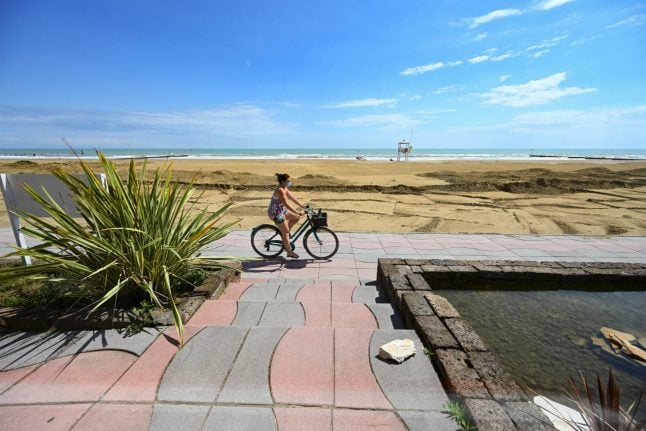Much of Italy is still waiting for visitors to return after the government imposed an economically crippling shutdown to halt the coronavirus pandemic, which has killed over 34,000 people, mostly in the country's north.
But at the Cavalieri Palace in the resort town of Jesolo on Venice's Adriatic coast, families play frisbee on the sand, sunbathe on deck chairs or order lunch at the hotel's poolside bar.
The four-star hotel is among the first to open its doors to international tourists.
“As soon as the borders opened on June 3rd, we had the pleasant surprise of finding four to five German families and an Austrian one having breakfast in our restaurant,” the hotel's owner Antonio Vigolo said with a smile.
It comes despite there still being a warning against non-essential travel in Germany. That warning is to be lifted for EU countries on Monday June 15th, however it will remain in place for countries outside the EU.
READ ALSO: What are the rules for travelling abroad from Germany this summer?
No fights over sunbeds
In Venice, guests need not fight over sunbeds, for most of the umbrellas and tables along the beach still lie empty. But it is a welcome start for the Jesolo hotel, which like all tourist establishments has suffered greatly from the coronavirus shutdown.
“I should have left the hotel closed, because it will be very difficult this year to break even. But I listened to my hotelier's heart and, along with my staff, said 'let's open',” Vigolo said.
German tourist Simone Freitag, her sunglasses perched on her head as she looked out to sea, said she and her husband were not worried about the virus, which experts warn may still be in circulation.
“We really feel safe in this hotel. They are doing a very good job. Everybody follows the rules,” she said.
Austrian guest Mathias Cardin, enjoying an espresso coffee on the hotel terrace with his partner, said the contagion numbers in the region were “getting better and better day by day”.
While the Veneto region had Italy's first coronavirus death, it moved much more quickly than Lombardy in the northwest to identify and isolate those carrying the virus. On Wednesday it reported only three new cases, compared with 99 in Lombardy.
“I think that there are more dangerous places now than Veneto and Jesolo!” Cardin said.
A break in Venice was a great way to “get back to having a quite normal life”, he said.



 Please whitelist us to continue reading.
Please whitelist us to continue reading.
Member comments